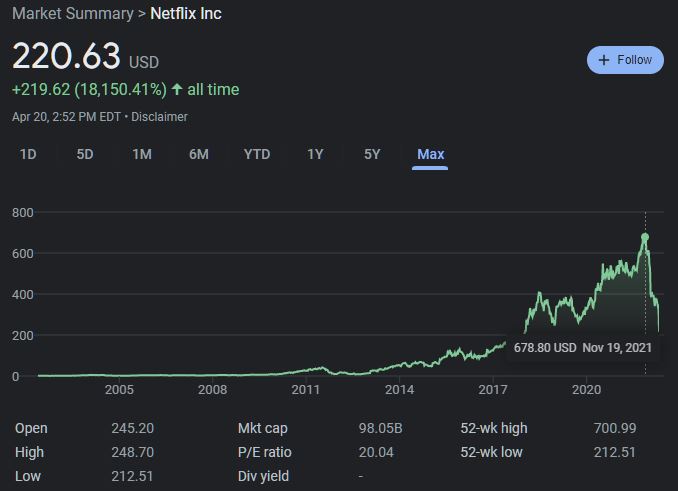No One Is Surprised That Netflix Lost 200,000 Subscribers in The First Quarter of 2021
Let's Talk About What in The 'Schitt's Creek' is Going On.

In the first quarter of 2022 (Janurary 1 to March 31), Netflix lost a net 200,000 subscribers, making it the first time in over a decade that the streaming service didn’t grow in subscriptions. If this weren’t bad enough, the loss was on the backdrop of Netflix projecting a 2,500,000 subscriber gain. Thier stock dropped roughly 30% in the last 24-ish hours. While Netflix continues to provide a handful of favorably received properties like Bridgerton, The Crown, Squid Game, and more, this drop was bound to happen. Everyone has beef with the company.
Stacking controversies from platforming bigoted comedians like Dave Chappelle (proud TERF), pay disparities, choosing to cancel fan-favorite content over bland hate-watched content, region-locked content, creepy cover art changes, and consistently colorist casting choices regarding Black women haven’t helped. A whole wiki page (divided into five categories) exists documenting Netflix criticism. To be very clear, not all of these grievances are equal. However, it does show that many people have issues with the company and the content for a broad range of reasons.
Market and global factors

In addition to user complaints, the streaming landscape has changed dramatically since Netflix started turning heads in the 2010s. People have more options with Disney+, Hulu, Amazon Prime, Apple+, Paramount+, HBO Max, Showtime, Startz, and ten more mainstream ones I’m forgetting or ignoring (sports). Those who are very online also consider alternative scripted and streaming programming in places like YouTube, Curiosity Stream, Crunchyroll, Criterion Channel, Mubi, IndieFlix, and more.
Netflix not only has to compete with them but also make up for the expired contracts for non-Netflix original shows they were licensing. Popular programming includes things like The Office, Friends, Disney movies (also Fox Studios), and more. The L.A. Times also noted that geopolitical events also affect subscriber numbers, like the war in Ukraine. When Netflix followed suit among the many companies boycotting Russia, it suspended Russia-based users, thus losing 700,000 subscribers. Even with that taken into account, they’re still a long way from their 2.5 million projection.
What’s coming next?
In the last few months alone, Netflix revealed they were beginning to test pricing plans for users in Chile, Costa Rica, and Peru who share passwords. Even the idea prompted backlash online. It’s basically an open secret that everyone shares streaming passwords even beyond their own households, which breaks many streaming sites’ terms of service, including Netflix, but everyone does it nonetheless.
If this downward trend continues, Netflix will have to restructure things to avoid going under. That may mean cutting off more shows or even (something rumored off and on for years) overt ads on the service, both of which could cause more trouble down the line, making their 222 million subscribers globally have less favorable thoughts on the service.
(via L.A. Times, image: Netflix)
—The Mary Sue has a strict comment policy that forbids, but is not limited to, personal insults toward anyone, hate speech, and trolling.—
Have a tip we should know? [email protected]
